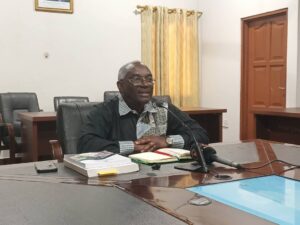NDPC to set clear development targets for citizens to assess governments

The National Development Planning Commission (NDPC) has taken steps to review Ghana’s 40-year Development Plan and set “clearer” and measurable targets to enable citizens effectively assess governments.
The Commission said it would breakdown the Agenda 2057 plan, simplify it to the understanding of the public and set specific targets for various sectors of national development.
Addressing journalists at a meeting in Accra on Friday, Dr Kodjo Esseim Mensah-Abrampa, Director-General, NDPC, said the Commission would convene a two-day National Development Summit from December 20 to December 21, 2023 as part of the review process.
He said the Summit would assemble stakeholders, experts, civil society organisations, traditional rulers, media professionals, and the public to make input into specific development targets for all sectors.
In 2018, Ghana, adopted a 40-year development plan (2018-2057), with the vision of achieving “a just, free and prosperous society” by 2057.
The plan provides a framework for national development in line with the NDPC’s mandate enshrined in articles 85, 86 and 87 of the 1992 Constitution.
Dr Mensah-Abrampa said the Review of Agenda 2057 had become necessary as some assumptions and projections that were made in the document had changed and that there was the need to set fresh targets.
He said the Commission would like to develop plans that would be owned by the people to enable them demand accountability alongside the national development agenda.
Dr Mensah-Abrampa said the Agenda 2057 appeared technical to the public, and thus the need to break it down into specific plans that could be easily identified and measured.
“We want to establish clear vision for the country in all quarters,” he told journalists, adding that the Summit would hold “frank and open discussion on the kind of Ghana we want.”
Dr Mensah-Abrampa said development plans developed by the NDPC were not binding on governments, but once it was approved by Parliament it became statutory document for the country, which should feed into all facets of development planning.
He said citizens must know the targets and vision for the country and use that to measure and demand accountability from governments.
“We want to tie governments to the vision and targets. The means of implementation of the plan belongs to the government, which has been given the mandate to execute the people’s vision and the people’s targets,” Dr Mensah-Abrampa said.
Source: GNA
